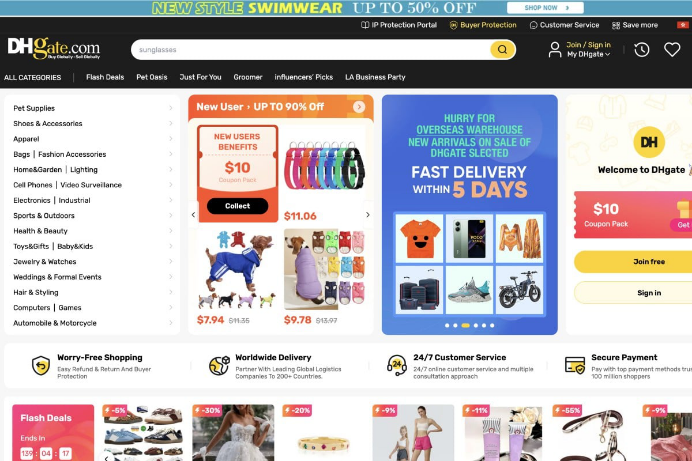
In April 2025, Chinese cross-border e-commerce app DHgate made headlines by climbing to second place on the US App Store free app rankings — surpassing major social platforms and trailing only ChatGPT.
Founded in 2004, DHgate takes its name from Dunhuang, a historic hub along China’s ancient Silk Road. Just as the Silk Road once connected Eastern and Western civilizations, DHgate now links international buyers with Chinese manufacturers. Over two decades, the platform has grown into a global giant, serving over 77 million registered users across more than 230 countries and regions. Arnold Ma, a UK-based e-commerce expert, notes, “While Alibaba dominated business-to-business (B2B) markets, DHgate carved its niche by helping small businesses worldwide access Chinese goods efficiently.”
The app’s recent popularity surge stems from viral TikTok content. Videos revealing that many luxury-brand suppliers operate in Chinese factories attracted millions of views. One clip by user “lunasourcingchina” showcasing Guangzhou workshops producing items for global fashion brands gained 3.5 million views in three days. Such content highlighted a key advantage: shoppers can purchase high-quality, non-branded alternatives of luxury items at a much lower cost. “There’s nothing Chinese factories can’t make,” remarked a TikTok user, fueling curiosity about DHgate.
DHgate offers a smooth shopping experience. Users can browse over 73,000 product categories, from electronics to fashion, with large-quantity purchase discounts available — a nod to its B2B roots. Safety is put first through a buyer protection program and a payment system that withholds funds until delivery confirmation. Ma stresses, “With proper research, buyers find products matching luxury quality standards at fair prices.”
The app’s success means more than commercial growth. Downloads jumped by 56% globally and 98% in the US within one week, proving its appeal. TechCrunch reports note its role in changing views of “Made in China”, showcasing innovation and craftsmanship. As DHgate rises, it carries forward the Silk Road spirit, promoting trust and cooperation in global trade.
原创编写 版权所有 侵权必究! 每日更新 个性化阅读 英语飙升!
1.1. The phrase “carved its niche” in Paragraph 2 most likely means ______.
A found a specialized market
B imitated competitors’ strategies
C created a physical sculpture
D reduced product prices
解析:选A。A 词义猜测题。根据该段内容“While Alibaba dominated B2B markets, DHgate carved its niche by helping small businesses...”可知,这里通过 “while” 形成对比,强调阿里巴巴(Alibaba)已主导传统 B2B 市场,而敦煌网(DHgate)选择了一条不同的道路:通过服务全球中小企业(small businesses)高效采购中国商品,在阿里巴巴主导的市场中开辟了独特领域。这种“差异化定位”正是“carve a niche”的典型表现,与选项 A 完全契合。故选A。
2.2. What directly caused DHgate’s sudden popularity according to the text?
A Its long history.
B Luxury items.
C Low prices.
D Popular videos.
解析:选D。D 推理判断题。根据第三段的“The app’s recent popularity surge stems from viral TikTok content. Videos revealing that many luxury-brand suppliers operate in Chinese factories attracted millions of views.”这款应用最近的人气飙升源于TikTok内容的疯狂传播。多段展示奢侈品牌代工厂位于中国的视频获得数百万播放量,即这些受欢迎的视频让“敦煌网”这个APP突然爆火。故选D。
3.3. What is Arnold Ma’s attitude toward DHgate’s products?
A They are cheap but low-quality.
B They balance quality and price fairly.
C They copy luxury designs illegally.
D They mainly suit large businesses.
解析:选B。B 细节理解题。根据第四段的“products matching luxury quality standards at fair prices”可知,他认为敦煌网的商品物美价廉。故选B。
4.4. What is the main purpose of the last paragraph?
A To compare DHgate with Silk Road.
B To explain technical features of the app.
C To emphasize DHgate’s significance.
D To predict challenges for e-commerce.
解析:选C。C 推理判断题。根据最后一段中的关键表达“reshaping perceptions of ‘Made in China’”和“carrying forward the Silk Road spirit”等可知,该段重点在强调敦煌网的(文化)意义。故选C。
